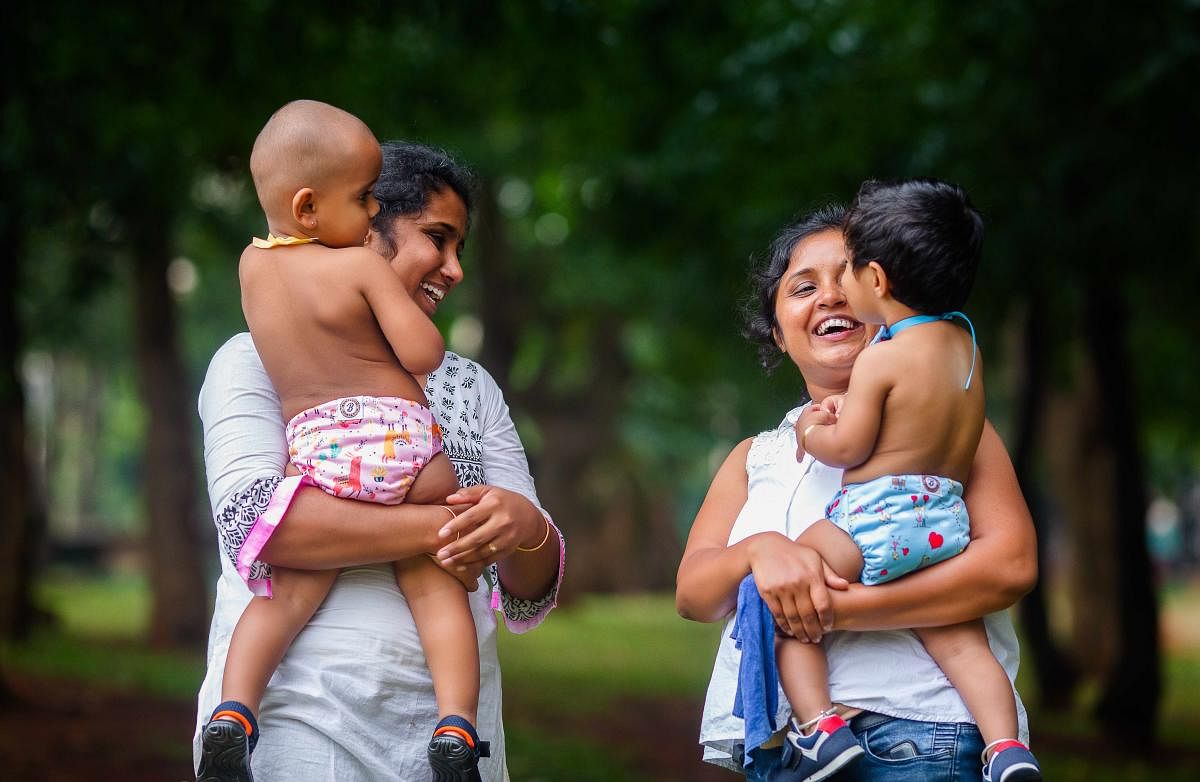
From turning leftover cooking oil to biodiesel to making non-throwaway diapers, everything little environment-friendly act can help the earth heal a bit.
In fashion, turning old into new
Fashion guru Prasad Bidapa, who has curated and choreographed the Sustainable and Ethical Fashion Show at Embassy Office Parks across four locations, says it is important for people to realise mindless fashion consumption is endangering the earth.
He says fashion is the second most destructive industry in the world. “We buy new clothes before we need them, and gigantic garment manufacturing companies throw unsold synthetic merchandise into landfills where they take thousands of years to decompose,” he observes.
Water used for growing cotton depletes groundwater, textile manufacturing byproducts pollute our rivers, seas and marine life, and cheap labour in the third world is exploited, he says.
Reusable cloth diaper
Bumpadum, a Bengaluru-based company, manufactures reusable cloth diapers. It aims to provide an alternative to traditional cloth nappies and disposable diapers.
Anuradha Rao, founder, says, “I was looking for eco-friendly diaper options, but found there were no cloth ones affordable in India. I wanted to start something that would make eco-friendly diapers that are economical, safe, chemical-free and comfortable for babies.”
She says Bumpadum diapers are leak-proof and smell-proof. They are made with hemp and organic cotton. The company has also introduced cloth menstrual pads under the brand name of Bhoomi.
These are made from the same material as the diapers. Bumpadum has sold close to 14,000 cloth diapers across south India so far.
A Bumpadum diaper costs Rs 699, and is available at www.bumpadum.com
Stationery that can turn into a plant
Dopolgy, a city-based start-up by Akshata Bhadranna and Rahul Pagad, makes a host of stationery products.
Realising how much plastic they had used over 28 years, they set out to find alternatives, but soon realised that was an expensive affair.
“Most people in India are from the middle-class, and we wanted to make sustainability affordable to them,” says Akshata.
The duo makes and sells pencils made from newspapers, bamboo charcoal toothbrushes, and cards with marigold and jasmine seeds that can be planted later.
“No matter at what price we are selling these products, or how effective they are, we have people who come back to ask how this will make a difference in their life. This constantly reminds us how much more work we need to do to spread awareness about being sustainable,” Akshata says.
Oxo-degradable sanitary disposal bags
Sirona, a menstrual and intimate hygiene product brand, offers a wide range of intimate and menstrual hygiene products that it says are environment-friendly.
The oxo-degradable sanitary disposal bags are tear-resistant and sealed to ensure zero bad odour or leakage. They degrade biologically in bits, unlike ordinary plastic bags.
Deep Bajaj, founder, PeeBuddy and Sirona, says, “Waste pickers separate out soiled napkins from recyclable items by hand, exposing themselves to various diseases. Once sealed, this bag prevents human contact with waste.”
The disposal bags are ideal for discarding products such as diapers, sanitary pads, tampons and condoms. Bajaj also encourages women to use menstrual cups and ditch their pads.
“Menstrual cups are environment-friendly, re-usable, economical and convenient to use,” he says.
Organic, no-bleach sanitary pads
Founded by Deepanjali Kanoria, a Kolkata-based entrepreneur, Heyday is now in Bengaluru. Made of corn and bamboo fibre, these pads take about six months to two years to completely decompose, while synthetic pads take about 450-500 years.
“Ninety-percent of the sanitary napkin that is synthetic is made out of plastic. The other raw materials include polymers, anti-bacterial agents, and bleaches which are harmful to a woman’s body and the environment,” says Deepanjali.
Bamboo has high absorbency quality, being a natural absorbent plant fibre. And, corn provides soft texture to the pad.
A Heyday pack with seven pads costs Rs 99.
Shorts from pants
Fashion guru Prasad Bidapa says he constantly promotes recycling and upcycling: a garment is given a new lease of life with minor alterations, or two old garments are used to make a new one. Old pants can be turned into new shorts, old saris can be used to make cushion covers.
Cooking oil becomes biodiesel
Indian Hotels Company Limited is collaborating with Mahatma Gandhi Institute of Rural
Energy Development (MGIRED) and developed a pilot project to convert waste cooking oil to biodiesel.
The Taj Group of Hotels is the first hotel chain to join the project.
“A friend of mine who works with the institute approached me and I was up for it. We wanted to convert the waste oil that we get every day in an environment-friendly
way. It is very hard to dispose of this oil as it
is hazardous to the environment. We offered to give it away free of cost,” Manoj Mathew, general manager, Taj MG Road, says.
The biodiesel provides fuel for government vehicles. The bi-products that act like soap can be used for handwash. Every month, 200 litres of
biodiesel are produced from leftover oil from Taj MG Road, he says.